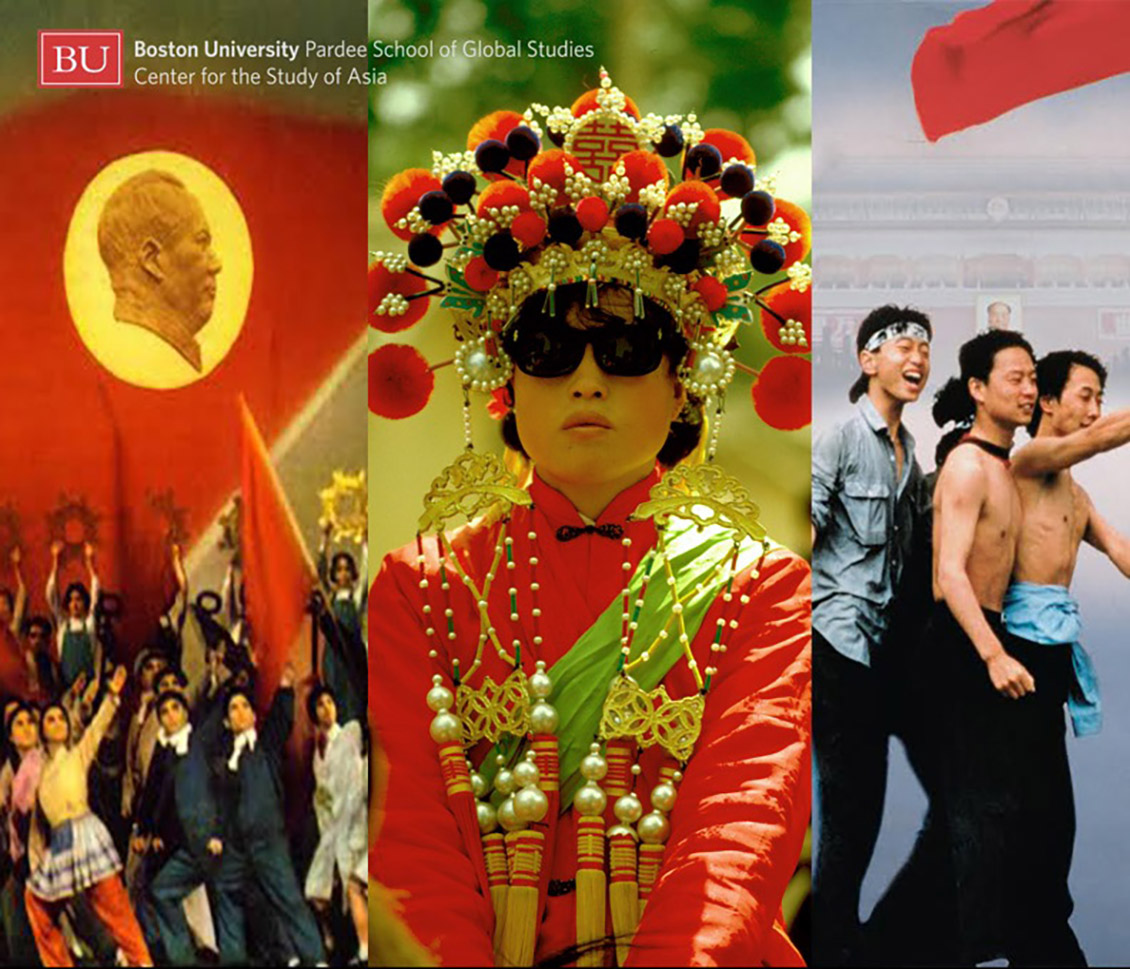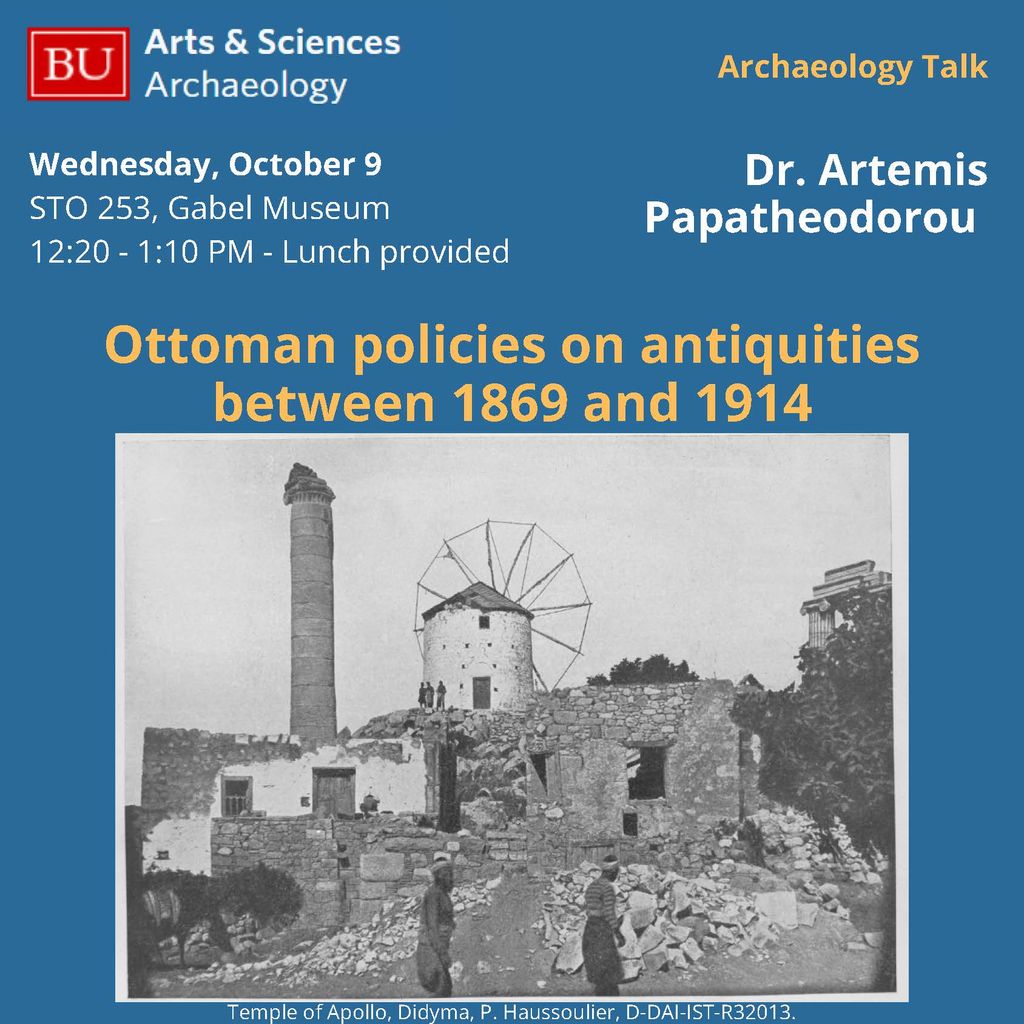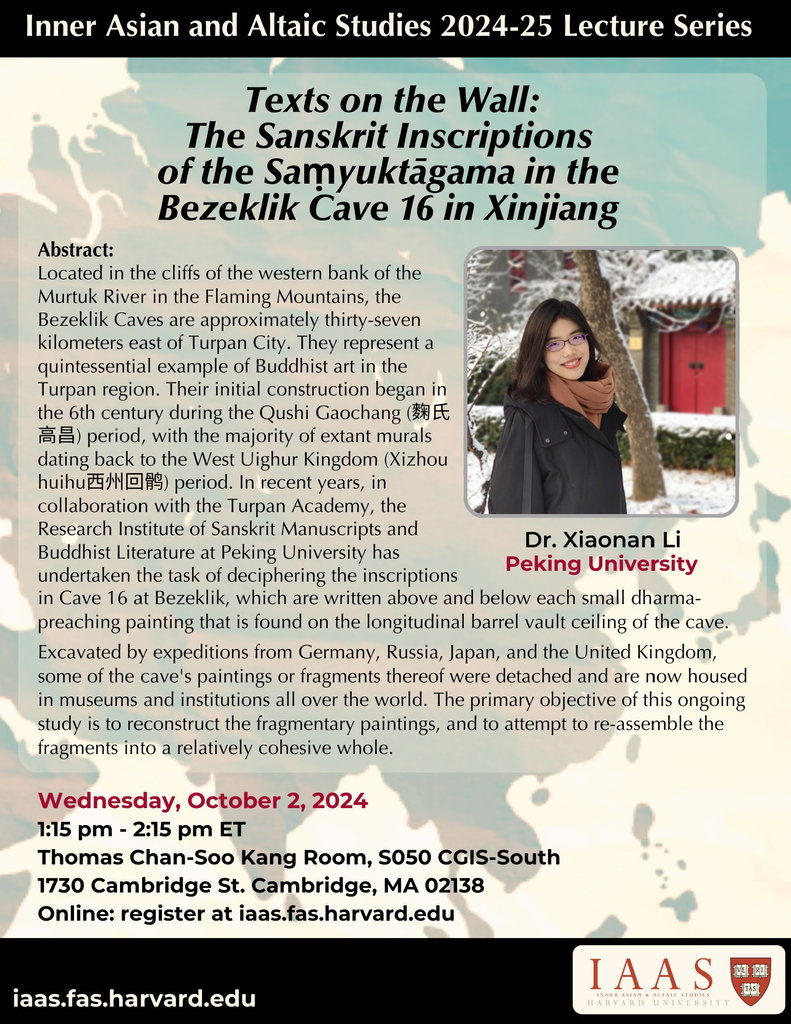History in Images, History in Words: In Search of Facts in Documentary Filmmaking
History in Images, History in Words:
In Search of Facts
in Documentary Filmmaking
A lecture by Carma Hinton
Robinson Professor of Visual Culture and Chinese Studies at George Mason University
Monday April 10, 2017 from 4-7 pm
at the Photonics Center (9th fl.), 8 St. Mary’s Street, Boston University
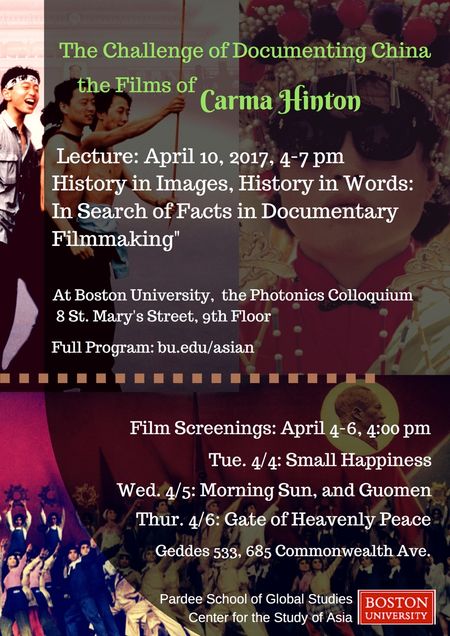 My presentation will focus on the process of documentary filmmaking, especially the many challenges my team and I faced in trying to create engaging filmic narratives that are both factually accurate and encompass multiple perspectives. I will use excerpts from my films as well as out-takes to illustrate the difficulties in determining what information to include and exclude, assess the compromises involved in the choices, and explore the consequences of taking various possible paths. I will also address the different problems that a historian encounters when presenting history in images as opposed to in words: the potential and limitation of each medium and what information each might privilege or obscure. I believe that in this age of “alternative facts” and “parallel universes,” reflections on the challenges in obtaining authenticity and truth and the importance of relentlessly striving to reach this goal, take on particularly urgent meaning.
My presentation will focus on the process of documentary filmmaking, especially the many challenges my team and I faced in trying to create engaging filmic narratives that are both factually accurate and encompass multiple perspectives. I will use excerpts from my films as well as out-takes to illustrate the difficulties in determining what information to include and exclude, assess the compromises involved in the choices, and explore the consequences of taking various possible paths. I will also address the different problems that a historian encounters when presenting history in images as opposed to in words: the potential and limitation of each medium and what information each might privilege or obscure. I believe that in this age of “alternative facts” and “parallel universes,” reflections on the challenges in obtaining authenticity and truth and the importance of relentlessly striving to reach this goal, take on particularly urgent meaning.
About the speaker:
Carma Hinton is an art historian and a filmmaker. She received her Ph.D. in Art History from Harvard University and is now Robinson Professor of Visual Culture and Chinese Studies at George Mason University. Together with Richard Gordon, Hinton has directed many documentary films, including Small Happiness, All Under Heaven, To Taste a Hundred Herbs, Abode of Illusion: The Life and Art of Chang Dai-chien, The Gate of Heavenly Peace, and Morning Sun. She has won two Peabody Awards, the American Historical Association’s John E. O’Connor Film Award, the International Critics Prize and the Best Social and Political Documentary at the Banff Television Festival, and a National News & Documentary Emmy, among others. Hinton is currently working on a book about Chinese scrolls depicting the theme of demon quelling. Carma Hinton was born in Beijing. Chinese is her first language and culture.

Ottoman Policies on Antiquities Between 1869 and 1914, with Dr. Artemis Papatheodorou (Weds. Oct. 9, 2024)
Ottoman Policies on Antiquities Between 1869 and 1914
Dr. Artemis Papatheodorou
- 10/16: Ido Koch, on Layers of History: Archaeology, Archives, and Oral Histories at Tel Hadid (near Tel Aviv, Israel)
-
11/20: Lilly Parker, on retrieving ancient DNA from polar and brown bears in Alaska
Layers of History: Archaeology, Archives, and Oral Histories at Tel Hadid, with Ido Koch (Tel Aviv Univ) (Weds. Oct. 16, 2024)
During the Fall of 2024, Boston University's Archaeology Program will be hosting a series of lectures. Our second lecture is titled “Layers of History: Archaeology, Archives, and Oral Histories at Tel Hadid.” We are thrilled to have
Dr. Ido Koch (Tel Aviv University)
Layers of History: Archaeology, Archives, and Oral Histories at Tel Hadid
Wednesday, October 16th, 2024 in the Gabel Museum of Archaeology, STO 253, 675 Commonwealth Avenue, 12:20-1:10 pm
Lunch provided.
-
11/20/24: Lilly Parker, on retrieving ancient DNA from polar and brown bears in Alaska
A Modernization Marching to Revolution: Science, Technology, and Diplomacy in Mao’s China (at Harvard-Yenching Institute, Oct. 17, 2024)
Speaker: Zhang Jing | Associate Professor, Department of History, Peking University; HYI Visiting Scholar, 2024-25
Chair/Discussant: Arunabh Ghosh | Associate Professor of History, Harvard University
Co-sponsored by the Fairbank Center for Chinese Studies
As a set of terms, “modernization” and its earlier discursive forms, such as “industrialization” and “Westernization,” have been continuously invoked by historical actors and historians throughout over a century of Chinese history, particularly during different historical stages such as the armed revolution, socialist revolution and construction, and the reform and opening up under the leadership of the Chinese Communist Party (CCP). This discursive phenomenon runs through various events in China’s recent century-long history, all referred to as “revolutions.” These include a series of continuous struggles led by the CCP against “colonialism,” “imperialism,” “feudalism,” “capitalism,” “bureaucratism,” and “liberalism.” The invocation of the term “modernization” by CCP leaders often served as a goal for the revolution to achieve or as a vision of construction after revolutionary success, aimed at rallying and inspiring revolutionary actions. The only notable exception largely occurred between 1966 and 1975. The modernization project initiated by Mao Zedong during the socialist revolution (1949-1956), which underwent a decade of exploration in socialist construction (1956-1966), ultimately devolved into the self-destructive and chaotic “Cultural Revolution” in 1966. To address the issue of this “modernization paradox” in the Maoist era, Professor Zhang will attempt to establish an interpretive framework from the perspective of discursive practice and state-building. Through a critical analysis of the relationship between discourse, knowledge, and power, she will examine the participation of discourse in state-building practices in the fields of science, technology, and diplomacy during the Maoist period.
CALL FOR PROPOSALS, Southeast Conference of the AAS (SEC/AAS) Jan 24-26, 2025 at University of Kentucky in Lexington, KY
|
CALL FOR PROPOSALS
|
|
|
SOUTHEAST CONFERENCE (SEC/AAS)
January 24-26, 2025
University of Kentucky in Lexington, KY
|
|
|
The 64th annual meeting of the Southeast Conference of the Association for Asian Studies will be hosted by the University of Kentucky in Lexington, KY, on January 24-26, 2025. Global Asias in a Deglobalizing World? |
|
|
We cordially invite conference participants to evaluate the dynamic concepts and methodologies that are paramount to our understanding of Global Asias at this pivotal moment. These encompass, though are not confined to, overarching themes such as “Global,” “Asia(s),” “Asian/ness,” “Asian American,” “Asian Diaspora,” “Asia-Pacific,” and “Transpacific.” Of particular interest are submissions that focus on understudied areas, notably South and Southeast Asia, and that offer innovative and unconventional perspectives on the following submissions that engage with, but are not limited to:
We extend a warm invitation to inquiries that deepen our understanding of the histories, cultures, languages, peoples, diasporas, and both local and global issues within the expansive purview of “Asia(s)” as broadly defined. We welcome submissions in various formats, including individual papers, panels, roundtables, and new book roundtables. The deadline for submission is October 31, 2024. If you have any questions or concerns about the conference, please do not hesitate to contact our local coordinators, Dr. Charlie Yi Zhang (charlie.zhang@uky.edu) and Dr. Liang Luo (llu222@uky.edu). |
|
|
Global China Fellows Program: Applications are open now for the 2025-2026 (Deadline Dec. 20, 2024)
Applications are open now for the 2025-2026 Global China Fellows Program
The Global China Fellows Program is a flagship program of the Global China Initiative (GCI) at the Boston University Global Development Policy Center (GDP Center). Since its inception in 2017, the Fellows Program has supported more than 40 Pre- and Post-doctoral Fellows from around the world to engage in policy-oriented research and commentary on China’s role in (re)shaping global affairs.
The Fellows Program provides a one-of-a-kind opportunity to engage and collaborate with GDP Center researchers, BU faculty members and Global South-based institutions to conduct policy-oriented research on China’s overseas economic activity and engagement with international institutions to advance financial stability, human well-being and environmental sustainability. Global China Fellows are paired with a BU faculty member or GDP Center Senior Academic Researcher under one of the four GCI workstreams: Data Analysis for Transparency and Accountability (D.A.T.A.); Forestry, Agriculture, Indigenous Rights and the Belt and Road Initiative (FAIR-BRI); Energy and Climate; and China and the International Financial Architecture (CHIFA). Fellows contribute to GCI research projects while receiving guidance and support on their own independent research projects. Fellows are expected to produce one GCI working paper per appointment year.
The primary objective of the Global China Fellows Program is to mold and train the next generation of thought leaders to advance policy-oriented, interdisciplinary academic research on China’s overseas economic activities and engagement. The Global China Fellows Program has a proven track record of bridging the gap between academia and policymakers through policy dialogue and engagement and strategic communications.
For full details, including biographies of past Fellows, please visit this site Global China Fellows Program
Required Qualifications:
- Pre-doctoral applicants must have completed their qualification/comprehensive exams and defended their dissertation proposal; post-doctoral applicants must have successfully defended their dissertation by August 2025;
- Strong research interest and expertise in China’s overseas economic activities and engagement with international institutions.
Preferred Qualifications:
- Experience in priority geographical regions of interest, in addition to China, such as Africa, Latin America and Southeast Asia;
- Fluency in Chinese or a language from one of the priority regions;
- Experience researching the relationship between China’s overseas engagement and the following issues is most preferred:
-
- The role of China and Chinese development finance institutions in expanding energy access and renewable energy, decarbonization and addressing climate change;
-
- Biodiversity and Indigenous Lands, geolocation and mapping;
-
- International economic institutions, reform of the global sovereign debt architecture, debt sustainability, the Global Financial Safety Net and RMB internationalization.
- The GDP Center accepts applications from scholars of all disciplinary backgrounds, especially the natural and social sciences, engineering and business. Quantitative methodological and modeling expertise are strongly preferred.
The majority of the fellowships will be awarded for the 2025-2026 academic year. Fellows will receive a competitive stipend and modest funding for data collection and/or fieldwork and potentially be eligible for reimbursement of relocation expenses. Fellows are expected to complete their fellowship in-person at the GDP Center’s offices at Boston University.
To apply:
Interested applicants should send the following materials in one PDF to the Global China Initiative Team (gci@bu.edu) with the subject line “<<LastName_FirstName>> GCI Fellow Application 2025-2026″:
- Recent Curriculum Vitae.
- A 1-2 page cover letter describing applicant’s academic training, research interests and experience.
- A 1-2 page working paper proposal that outlines the research question(s), methodology, research plan and its significance.
- Contact information for two references.
Applications must be received by December 20, 2024, 11:59 PM EST. Applicants will be reviewed on a rolling basis, with screening interviews starting in October. Due to the volume of applicants, only shortlisted candidates will be contacted.
For International candidates: International candidates will need express approval from their sponsoring institution stating that the potential fellow is allowed to earn income from another institution. This is especially important for international students with J-1 visas. Note: If you do not currently have a valid US scholar visa, certain research positions at Boston University qualify for immigration sponsorship. Prospective scholars should first establish their potential affiliation with the GDP Center as a pre- or post-doctoral fellow and clarify the terms of their appointment. BU’s International Students and Scholars Office (ISSO) will work with the prospective scholar and the GDP Center to evaluate which immigration classification is most appropriate. The ISSO will consider various factors such as the appointment/affiliation terms, the scholar’s educational achievements and US immigration history.
Placement:
Previous GCI Fellows have gone on to receive placements in academic faculty and research positions, leadership roles at global development institutions and more. Some institutions where previous fellows now work include:
-
-
-
- Peking University
- University of Denver
- Overseas Development Institute
- Boston Consulting Group
-
-
Testimonials:
“Serving as a Post-doctoral Fellow at the Boston University Global Development Policy Center has undeniably been one of the most enriching and fulfilling chapters of my academic journey. The focus of my research revolved around the intricate intersections of sovereign debt issues, climate finance and the renewable energy landscape in Africa.
The experience of immersing myself in such multi-disciplinary research was transformative. It broadened my perspective and deepened my understanding of the complex interplay between economic policy, environmental sustainability and developmental trajectories. Moreover, the collaborative environment fostered at the Global Development Policy Center was instrumental in my growth. Working alongside esteemed scholars and experts in the field provided invaluable insights, encouraged robust discussions and nurtured an environment where innovative ideas could flourish.
Overall, this fellowship has not only enriched my academic portfolio but has also shaped my approach towards addressing critical global issues.” – Magalie Masamba, 2021-2022
“The Boston University Global Development Policy Center strikes a careful balance between rigorous scholarship and relevance in policy debates, a rare and valuable combination among research institutions. That also means that no matter which side of the spectrum you start on, time there offers abundant opportunity for new experience and growth. I found research and discussion to be rich and collaborative, dramatically strengthening my expertise while providing a supportive environment to pursue my own ideas.” – Jake Werner, 2020-2022
“Serving as a Global China Pre-doctoral Fellow was rewarding professionally and personally. I was able to be part of a very inspiring and encouraging group of scholars who cared about the research topics I’m interested in, and who provided the support and resources to delve into the examination of key issues and concerns. Although the fellowship was conducted virtually due to the COVID-19 pandemic, I was able to establish meaningful friendships and connections—some of which have gone on to coauthor research with me! In all, the fellowship allowed me to learn from other experts and to continue moving my work forward in important ways.” – Victoria Chonn Ching, 2020
“My time as a GDPC Global China Research Fellow helped me develop as an interdisciplinary, collaborative, and policy-oriented scholar of global China, and was undoubtedly pivotal in shaping my academic career. The team at the center cultivates a welcoming intellectual space for budding academics to develop their ideas, work with like-minded researchers and connect with the wider China research and policy community. I joined the center directly from my fieldwork and was grateful for the support and thought-provoking dialogue that helped me develop my early research findings. The mentorship from seasoned experts at GDPC was invaluable in shaping the trajectory of my research and career. Their nuanced understanding of global China and dedication to nurturing emerging scholars is truly commendable. I am impressed by how the cohort of fellows continues to grow, bringing together individuals from different backgrounds and fostering a global network of scholars. My fellowship was not only a research opportunity but a platform for personal and intellectual growth. I wholeheartedly endorse this program for those eager to contribute meaningfully to the study of global China.” – Jessica Dicarlo, 2019-2020
“One of the best things about working in the Boston University Global Development Policy Center is that it provides an interdisciplinary environment where I can easily expand my horizons by learning from and working with members of the center. Even during the pandemic, the center managed to create many opportunities, such as online research colloquiums, to ensure frequent communications with scholars from different fields. My research also benefits a lot from the interdisciplinary nature of the center. I can always get timely support from the center in my projects to evaluate the social, environmental and public health risks from China’s overseas development finance.” – Hongbo Yang, 2020-2021
TODAY! PRC @ 75 Series – Symposium: The People’s Republic of China at 75 (at Harvard, Sept 30, 2024)
PRC @ 75 Series – Symposium:
The People’s Republic of China at 75
September 30, 2024 @ 4:30 pm – 6:00 pm
at Harvard University, CGIS South, Tsai Auditorium (S010), 1730 Cambridge St
Cambridge, MA 02138
Speakers:
 Joseph Fewsmith, Professor of International Relations, Pardee School of Global Studies, Boston University
Joseph Fewsmith, Professor of International Relations, Pardee School of Global Studies, Boston University
Elizabeth Perry, Henry Rosovsky Professor of Government, Harvard University
Anthony Saich, Director, Rajawali Foundation Institute for Asia; Daewoo Professor of International Affairs, Harvard Kennedy School
Yuhua Wang, Professor of Government, Harvard University
Moderator:
Mark Wu, Director, Fairbank Center for Chinese Studies; Henry L. Stimson Professor of Law, Harvard University
https://fairbank.fas.harvard.edu/the-peoples-republic-of-china-at-75/
Congratulations to Prof. Daigengna Duoer for winning a Career Development Professorship!
Daigengna Duoer, a College of Arts & Sciences assistant professor of religion, who explores the religion and politics of China, Japan, and Russia, “is a rising star in Asian studies,” writes her nominator, Stan Sclaroff, dean of Arts & Sciences. “She is a highly promising scholar making significant contributions to interdisciplinary studies of Asia, writ large, with focus on China’s shifting borders and dynamic tensions with other modern nations and empires.”
Her forthcoming book, “Buddhism Beyond the Nation and the Empire: Transnational Buddhists in Modern East and Inner Asia,” investigates Buddhism’s roles within and beyond the competing nation and empire-building projects that took place in early 20th century Inner Mongolia and Manchuria, regions sandwiched between the expansionist ambitions of Republican China, the Japanese Empire, and the Soviet Union. Her research has been supported by the Canadian Social Sciences and Humanities Research Council (SSHRC), Zeit-Stiftung Bucerius, the Mongolia Foundation, the Chiang Ching-Kuo Foundation, and the American Council of Learned Societies (ACLS) Robert H. N. Ho Family Foundation, amongst others.
Daigengna is a host for the New Books in East Asian Studies Channel, a channel on the New Books Network. In addition to the study of religion, Daigengna is also interested in the study of religion in game media. She is one of the founders of the GAMING+ Project, an online resource for game studies, along with Kaitlyn Ugoretz and Keita Moore.”
Fall 2024 Courses:
RN 452: “Topics in Religious Thought” Topic: Zen Thought and Practice
Description: Explores Zen thought and practice across various Asian and global Buddhist traditions through texts and material culture, focusing on debates on metaphysics, the mind, and knowledge as applied to meditation, ethics, aesthetics, militarism, environmentalism, and aspects of daily life.
RN 210: “Buddhism”
Description: A historical and critical introduction to the major themes of Buddhist thought and practice in India and Southeast Asia, with special attention to the transmission of Buddhism to Tibet and the modern West. This course fulfills a single unit in each of the following BU Hub areas: Historical Consciousness, Global Citizenship and Intercultural Literacy, Critical Thinking.
Imagining Other Times and Other Minds in Tiantai Buddhism: Toward the Non-Duality of Synchronic and Diachronic Experience, with Brook Ziporyn (at Boston College, Sept. 24, 2024)
The Asian Studies Program at Boston College presents The Daniel C. Morrissey ‘88 and Chanannait Paisansathan MD Distinguished Lecture in Asian Studies
Imagining Other Times and Other Minds in Tiantai Buddhism:
Toward the Non-Duality of Synchronic and Diachronic Experience
Brook Ziporyn
(Mircea Eliade Professor of Chinese Religion, Philosophy, and Comparative Thought, The University of Chicago)
Tuesday Sept. 24, 2024 at Gasson Hall 305, Boston College
Details 
Details available at https://events.bc.edu/event/imagining-other-times-and-other-minds-in-tiantai-buddhism-toward-the-non-duality-of-synchronic-and-diachronic-experience.
About the speaker:
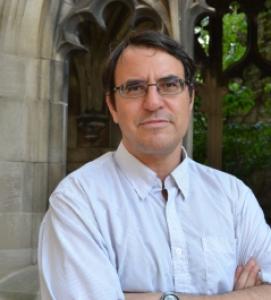 Brook A. Ziporyn is a scholar of ancient and medieval Chinese religion and philosophy. Professor Ziporyn received his BA in East Asian Languages and Civilizations from the University of Chicago, and his PhD from the University of Michigan. Prior to joining the Divinity School faculty, he has taught Chinese philosophy and religion at the University of Michigan (Department of East Asian Literature and Cultures), Northwestern University (Department of Religion and Department of Philosophy), Harvard University (Department of East Asian Literature and Civilization) and the National University of Singapore (Department of Philosophy).
Brook A. Ziporyn is a scholar of ancient and medieval Chinese religion and philosophy. Professor Ziporyn received his BA in East Asian Languages and Civilizations from the University of Chicago, and his PhD from the University of Michigan. Prior to joining the Divinity School faculty, he has taught Chinese philosophy and religion at the University of Michigan (Department of East Asian Literature and Cultures), Northwestern University (Department of Religion and Department of Philosophy), Harvard University (Department of East Asian Literature and Civilization) and the National University of Singapore (Department of Philosophy).
Ziporyn is the author of Evil And/Or/As the Good: Omnicentric Holism, Intersubjectivity and Value Paradox in Tiantai Buddhist Thought (Brill, 2000), The Penumbra Unbound: The Neo-Taoist Philosophy of Guo Xiang (SUNY Press, 2003), Being and Ambiguity: Philosophical Experiments With Tiantai Buddhism (Open Court, 2004); Zhuangzi: The Essential Writings with Selections from Traditional Commentaries (Hackett, 2009); Ironies of Oneness and Difference: Coherence in Early Chinese Thought; Prolegomena to the Study of Li (SUNY Press, 2012); and Beyond Oneness and Difference: Li and Coherence in Chinese Buddhist Thought and its Antecedents (SUNY Press, 2013). His seventh book, Emptiness and Omnipresence: An Essential Introduction to Tiantai Buddhism, was published by Indiana University Press in 2016. He is currently working on a cross-cultural inquiry into the themes of death, time and perception, tentatively entitled Against Being Here Now, as well as a book-length exposition of atheism as a form of religious and mystical experience in the intellectual histories of Europe, India and China. Zhuangzi: The Complete Writings, translated and with introduction and notes by Brook Ziporyn was published by Hackett in 2020, and his translation of the Daodejing was published by Liveright Books and the Norton Library in 2023.
To learn more about Prof. Ziporyn's work, visit his website, "Moretoitivities."
Texts on the Wall: The Sanskrit Inscriptions of the Saṃyuktāgama in the Bezeklik Cave 16 in Xinjiang (at Harvard and via Zoom, Oct. 2, 2024)
Texts on the Wall: The Sanskrit Inscriptions of the Saṃyuktāgama in the Bezeklik Cave 16 in Xinjiang
Dr. Xiaonan Li 李晓楠 (Peking University)
PRC @ 75 Series – Film Screening – Remembering the 1980s: The Documentary Series Tiananmen, featuring an introduction by Yuhua Wang & Zoom Q+A with Shi Jian (at Harvard, Oct. 4, 2024)
PRC @ 75 Series – Film Screening
Remembering the 1980s: The Documentary Series Tiananmen, featuring an introduction by Yuhua Wang & Zoom Q+A with Shi Jian
October 4 @ 12:00 pm – 8:30 pm
Venue: Harvard University, CGIS South, Tsai Auditorium (S010), 1730 Cambridge St., Cambridge, MA 02138

Introduction: Yuhua Wang, Professor of Government, Harvard University
Programmer: Sam Maclean, Communications Manager, Fairbank Center for Chinese Studies
Followed by a Zoom Q+A with filmmakers Shi Jian, co-director of Tiananmen
The eight-part documentary series Tiananmen, about life in Beijing in the 1980s, was produced with official sanction by a brilliant young team of filmmakers at China Central Television (CCTV). It had a planned airing commencement date of National Day — October 1, 1989 — to commemorate the 40th anniversary of the People’s Republic of China. However, production halted in the spring of 1989, when students calling for democracy and an end to corruption took to the streets in Beijing. Following the violent crackdown on June 4th, CCTV canceled the series, concluding that any with the title “Tiananmen”—regardless of its political slant—would be too controversial to air.
But co-directors Shi Jian (时间) and Chen Jue (陈爵) decided to finished Tiananmen independently. The series was invited to screen at the Hong Kong Film Festival, in 1992, but the Chinese film delegation boycotted it, and the screening was canceled. Since then, the full documentary has only screened publicly once (in Chicago, this past summer).
This historic series weaves a tapestry of sociopolitical life whose scope stretches from the survivors of the pre-revolution imperial court to the competitive struggles sparked by the transition to a planned economy, to liberalization in the shadow of the not-too-distant Cultural Revolution, to the vibrant artist communities and counterculture movements, and ultimately, to what registers as a sense of guarded optimism about China’s 21st century trajectory.
Yuhua Wang (王裕华) is Professor of Government at Harvard University, whose research focuses on two aspects of the politics of state building. He looks at what contributes to the emergence of effective and durable statehood, and after an effective state emerges, how it can be constrained. Professor Wang’s third book, The Rise and Fall of Imperial China: The Social Origins of State Development (2022, Princeton University Press) won the 2023 Lubbert Best Book Award in Comparative Politics from the American Political Science Association. His articles have appeared in American Political Science Review, Annual Review of Political Science, British Journal of Political Science, Comparative Political Studies, Comparative Politics, and China Quarterly.
The Fairbank Center’s film screening series explores the largely unseen early history of independent film in China, beginning in the late 1980s, aiming to unearth films long-suppressed by Chinese authorities to fill out the narrative of modern film history in the PRC.
Tiananmen’s 8 parts will screen in groups of two throughout Friday, October 4, with short breaks:
12:00 PM: Introduction by Yuhua Wang, Professor of Government, followed by Part 1: “The Old City” (56 min.), about survivors of the imperial court, including interviews with the last living imperial eunuch and Puyi’s family members, and Part 2: “Residences” (51 min.), which explores everyday life in courtyard homes.
2:15 PM: Part 3: “On the Street” (52 min.), about various forms of commerce and social activities, and Part 4: “On Stage” (54 min.), a survey of theater actors, street performers, and rock musicians.
4:15 PM: Part 5: “Going Places” (48 min.), about intellectual life at universities and inside private enterprises, and Part 6: “Guest Performers” (48 min.), which follows foreigners who live and work in Beijing.
6:00 PM: Part 7: “On the Way” (50 min.), about entrepreneurs in the entertainment industry, including ad agencies and models, and Part 8: “Memories” (1 hour), a look at China’s history of sociopolitical unrest.
The final episode will be followed by a Zoom Q+A with Tiananmen directors Shi Jian and Chen Jue.
Trailer on YouTube can be seen at https://youtu.be/YiIc5udBcTY
